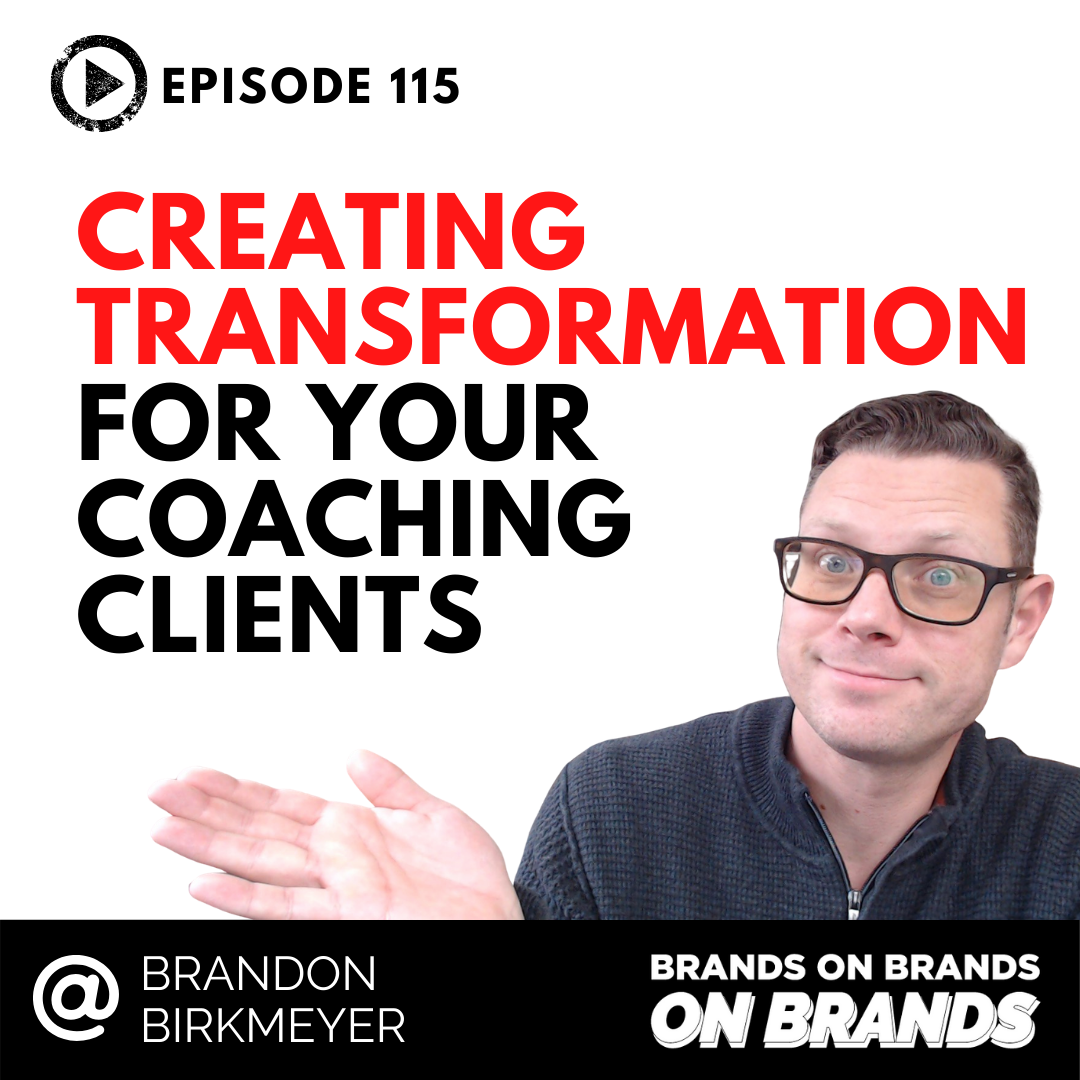Value exchange is the No. 1 secret to creating a transformation in the life of someone you’re coaching. It’s the trading of your content or service for something of value from your client.
It’s also the final piece in a 13-episode series on the Brands on Brands personal branding framework.
Funny I saved this for last, right? The reason I put this last is that a lot of us gloss over the idea of goals: figuring out why we’re doing something, who it’s for, and how we’re going to help them.
[iframe style=”border:none” src=”//html5-player.libsyn.com/embed/episode/id/13500389/height/90/width//thumbnail/yes/render-playlist/no/theme/custom/tdest_id/1265045/custom-color/2ddae4″ height=”90″ width=”100%” scrolling=”no” allowfullscreen webkitallowfullscreen mozallowfullscreen oallowfullscreen msallowfullscreen]
RELATED: Learn about the Brands on Brands personal branding framework, and delve into the three major elements — message, community and impact.
I learned a long time ago, after 18 years of marketing, that if you don’t have a well defined goal, you are never going to hit the mark because you don’t know what mark you’re aiming for. Like anything in life, if you are very clear about what you’re aiming for, what you’re intending, how you’re measuring that, then you are better prepared, better off, better set to hit that goal right in the middle.
The critical piece of creating value and transformation for someone is to understand what you are trying to accomplish together.
What is going to change? How are you going to make a difference?
There are three steps to creating value exchange:
- Define success to make a real difference for your coaching clients.
- Make sure your clients make a financial commitment to your program.
- Provide a measurable ROI.
Define What Success Looks Like for Your Coaching Program
Hopefully, everyone you’re bringing to your business has a similar purpose and goal in mind. They were attracted to you because you made a promise telling them that wherever they are, you can take them to where they want to be. You’ve defined what that is, and that’s why they found you.
Your first goal is to have a conversation with your client about exactly what you want to accomplish. I’m not going to delve into goal-setting, but you can do the research on what makes a good goal. Google SMART goals, where SMART is an acronym, and do the research on what it means to have a very effective goal-setting approach.

Now, imagine you work with someone who needs guidance. You give them some tips, and they feel a little bit better. Maybe they have some new resources that help them. You got them moving on something, but you never defined where they were going to end up.
What they’re going to feel when they leave that coaching engagement is that they didn’t finish anything. The only way to know and feel that sense of completeness, that sense of closure in a coaching relationship, is to really define what success looks like exactly, from top to bottom.
Is success having a finished product? Is it that you have a measurable result? Maybe it’s simply knowing the steps needed to move forward.
Whatever success is, you need to define it before you begin coaching. You have to define that, and you have to be responsible. The coach — not the client — needs to be responsible for laying out exactly what the objective and results look like.
Be specific
For me, it’s pretty simple to begin with. The before is that you didn’t have a podcast. The after is that now you have one.
But do you go a step further? Do you say, “You’ll have a well-positioned podcast?” Or, “After I give you these systems, I guarantee you’ll have a podcast that you can build consistently over time.”
Does success mean being ranked in a certain way? Does it mean having the tools to get the right speakers on the show and a list of people who will actually build authority in your industry?
All these things are great, but having the definition of success is what matters.

Understand your client’s goal: to make money? Grow an audience? Is it to build authority? Is it to set the foundation for a coaching business?
Those are all things you and the client need to work out together. And you, as a coach, can outline that and say, “This is what we define success as. This is what we’re looking to accomplish, and this is what I can actually help you with.”
Once you have that result set, then you can work toward making it happen.
If you’re not setting a goal that actually makes a difference in someone’s life, transforms them, solves problems, removes barriers, then it’s not worth it.
So, the step is to define the goals and create the purpose, but the heart of it is that it actually has to be truly connected. The goal has to connect to something that’s going to move them forward toward what they’re really trying to accomplish. So you have to make a measurable difference, a real difference in their lives, in their careers, in their path, whatever it is you’re helping them with.
What Is Your Client’s Financial Commitment to Your Coaching Program
The next step in creating transformation is a value commitment. Typically, that value is money, but it doesn’t have to be.
For those of you who are getting started, the value provided by the client could just be a testimonial. You can say upfront, “If we do this well, I would love a thoroughly engaged testimonial, whether it’s video or audio or written.”

Your expectation is if the client has been changed, they’ll put in the effort to successfully create a testimonial, to make it a priority and not put it on the back burner, because you need someone who can move through this quickly to help you continue to grow at a rapid pace. You don’t need the person who’s dragging their feet, thinking this doesn’t matter they’re not paying for it.
The value commitment has to be established upfront because the people who are putting in the work need to understand why they’re doing it. What’s the value of it?
I don’t know who started the quote, but there’s this idea that people value things they pay for. I’ve also heard that people chase the things that run away from them.
The truth is, when you assign a monetary value to something — when you spend money — you’re making an investment and a commitment, and it’s more than just your time. It’s your time, your resources, your money, your effort.
That commitment from the person who’s engaging with you in a coaching relationship has to be present. They need to feel that they risk wasting or losing something if they don’t follow through.
Coaching Only Works with Accountability
A lot of us need to be held accountable. A lot of us won’t finish what we start, and you don’t want to start a relationship with someone who isn’t going to finish. Your best way to ensure value is exchanged on both sides is to make sure the client is truly in it and committed. Finding a way to develop that commitment is what’s going to help that client not only take and pay for your content, but finish it and get value.

If you actually want to transform someone, they need to be able to complete the thing you’re doing. Just creating a digital course isn’t going to create transformation because you’re not guaranteed to finish this course and to take action on it.
So, when you’re working one on one with someone, you need to define what sets you apart and establish the value exchange upfront: “What are we going to do to make sure you’re committed to this process?”
It can be a combination of these things, but there has to be some kind of value exchange so that the person on that other end of the relationship is fully invested in challenging themselves to go deeper and follow-through.
Be honest upfront
And it’s not just finishing. A lot of us can finish something, but there’s something about really being challenged to dive deeper: to do the harder things, to ask the extra question, to go further above and beyond, and make something good that takes us through that transformation process. That extra effort is what makes results more than just good — it makes them great.
Finding the people who are willing to do that takes a higher level of commitment. Raising the stakes to establish a higher level of commitment with your people will get better performance out of them because they feel the loss if they break that commitment.

Value commitment is super important in actually creating transformation. Not everyone is self-motivated. Sometimes they need something or someone outside of themselves to find the energy to be committed to this process. You’re creating a reality check for them to say, do I actually have the time to finish what I’m going to start on this?
Maybe it’s not the right time for them. If you don’t challenge them, they’ll sign up for anything, but they won’t follow through. If you challenge them by saying “This is a real commitment, and it’s going to burn if you don’t finish,” then they have to figure out, “Well, does this fit into my schedule? Is this something I’m ready for right now? Are there other things I need to do first?”
They’re going to be honest with themselves because they realize there’s a real sense of loss if they don’t do it.
Provide measurable ROI for your coaching program
You’ve got to uphold your end of the value exchange by creating a measurable difference for your client. You need to be able to point and say, “You did/didn’t do this,” or, “You did/didn’t do this well.”
Whatever those outcomes are, you can write out the results. Are they quantifiable in some way? Now, this isn’t just the hours you put in. It’s what is happening at the end of the process.

Look back at your client’s goals. Maybe he said, “My goal is to have a show.” Well, how do you define that? For me, a show means not only that I’ve recorded an episode, but that I’ve built a series of episodes that can be recorded.
I’ve got the proper intros and outros. I’ve got the cover art, I’ve done the work to find a position for my show that is ownable, and I’ve set myself up to continuously deliver that for a number of weeks that I’ve committed to upfront. I’ve got a deliverable show that I’m proud of, with guests like and respect.
And you can take it a step further and say, “I just don’t want a show, I want a show that accomplishes this goal.”
Well, how do you define that?
Is it a number of downloads and follows? Is it the business behind the podcast? What’s the goal for that business? How many leads are gonna come from the podcast, or are we trying to use the business to drive leads to the podcast and create a way to turn cold leads into warm leads?
Define value in numbers, not concepts
The return on investment is something that you can say you can point to and say whether it was achieved or not.
For example, what is the number of new people in your world who convert to buyers who convert to loyal advocates? Define the numbers behind the business, behind the coaching program, behind the thing I’m helping you build. At the end of it, there needs to be some kind of return.
Here’s a good example. Say you hire someone to do your Instagram for you. The only goal that you’ve committed to with them is to make your brand look good. So they start posting a bunch of stuff, and then you realize you’re spending all this money month to month, but there’s no one actually coming into your business and turning into leads for your business.
Then you start to wonder, why did I do this in the first place?

Set the right coaching goals
The problem isn’t the job being done. That person did what you paid them for: They created a beautiful Instagram page for you to post on.
But you defined the wrong goals. You didn’t define a goal that actually makes a difference in your business.
Setting the right goal means thinking, “I want some ROI on this and some dollars driven into my business.” Then you can come up with what’s realistic for that.
Now, how do we measure that? Maybe it’s leads. What’s your lead count? How are you going to get leads from this thing you’re doing? Maybe just posting on Instagram isn’t going to get you there. Or maybe it is, but you need to figure out how that works, because if you haven’t designed that from the beginning, you probably aren’t setting yourself up for success.

So come up with a measurable ROI, a measurable return that you and your client can look at and ask, does this map to our goals? Is it something that we can look at and count and say yes or no, it was successful or it wasn’t? And to what degree was it successful?
You want your clients to have expectations that you can point to and say, “We all agreed to this. There’s no confusion here. We know what success looks like.” Then you’ll have happy clients when you deliver on and hopefully exceed those expectations because you knew what they were. You knew what the goal was. You can create a meaningful experience together that gives them this difference that they’ve asked for.
Value adds up to impact
Impact is what’s happening. You are making an impact through this shared meaningful experience with your coaches, your clients, your customers. Shared meaningful experiences create advocacy and impact in someone’s life.
You’re creating someone who’s going to go out there and tell your story to other people and say, “This is what he did for me. You need this thing. I know because you’re in the same place I was.”
You’re not going to have impact when you don’t know what you’re shooting for and you can’t measure it.
MORE ADVICE
Want to review the personal branding framework? Dive deeper into message, community, and impact in these episodes:
- Message: How to Create Brand Positioning and Identity, The Best Media Channel for Personal Branding, and Leveraging Social Proof for Your Brand.
- Community: Building Authority in Your Community, Brand Awareness for Personal Brands, and Creating a Terrible Lead Magnet.
- Impact: How to Create Coaching Models, Creating Expert Coaching Tools, and Creating Transformation for Your Coaching Clients.
